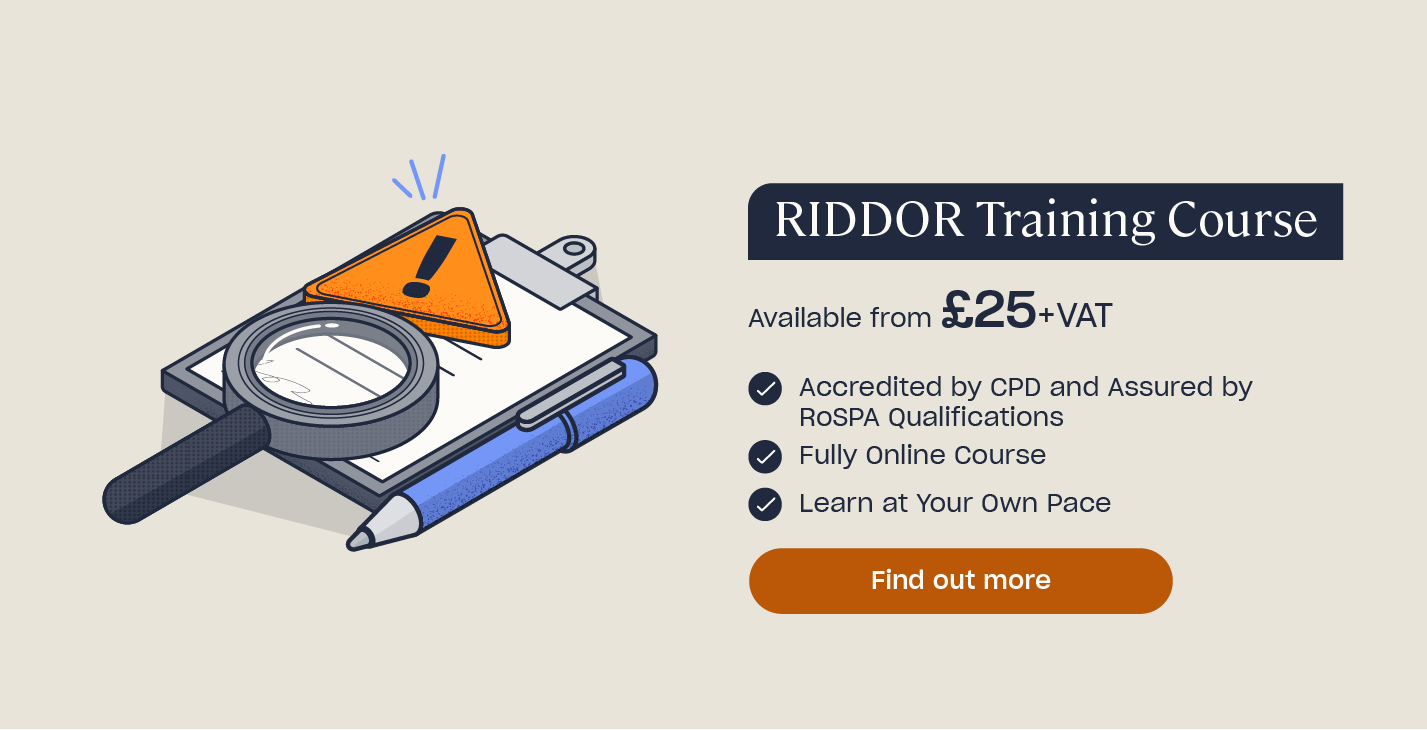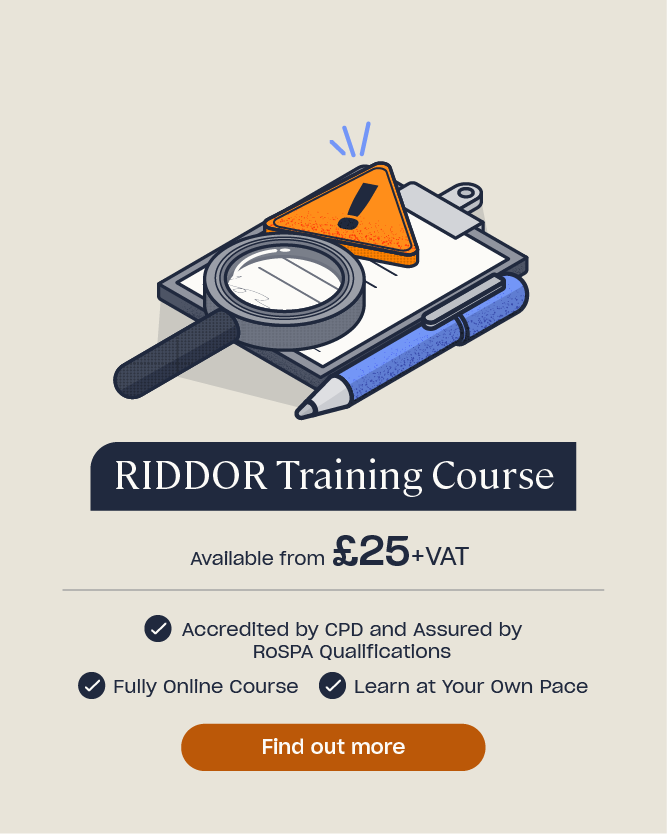What is RIDDOR & Why is it Important?
RIDDOR (The Reporting of Injuries, Diseases and Dangerous Occurrences Regulations 2013) is a UK health and safety legislation. It applies to all ‘responsible persons’ and requires them to correctly report and keep a record of certain injuries and incidents that happen at work. Therefore, as an employer or someone in a position of authority, it is important that you know exactly what the law says.
Why is RIDDOR Important?
In 2022/23, an estimated 561,000 injuries occurred at work and 1.8 million working people were suffering from a new or ongoing work-related illness. RIDDOR, then, is in place to keep you and your colleagues safe at work. The legislation is important because it holds employers responsible for negligence or bad working behaviours. In practice, this encourages people to follow health and safety procedures in the workplace, which helps to prevent accidents.
Furthermore, when you follow RIDDOR it helps the UK governmental department, the Health and Safety Executive (HSE), to keep a record of work-related incidents. This information allows them to identify where and how risks are arising so they can prevent similar occurrences.
If employers ignore RIDDOR and fail to report incidents, they are breaking the law. In 2011, Tesco admitted to not following essential procedures for reporting staff injuries at two of its stores. As a result, the company was fined £34,000 for RIDDOR failures.
By following procedure and reporting any incidents as required, employers ensure that these risks are addressed and kept to a minimum. This keeps everyone safe in the workplace and ensures that the image of the company is not tarnished.
Need a Course?
For a greater understanding of RIDDOR, and to prove you are trained to responsibly manage these risks, you may wish to take our RIDDOR Training Course. It covers all aspects of the RIDDOR legislation so that the responsible person understands when, why and how to make a suitable report.
Employee Responsibilities
General employees do not have a legal responsibility to report incidents under RIDDOR. However, if, as an employee, you witness or experience something that falls under RIDDOR, you should report this to an appropriate supervisor. Members of the public (including general employees) can’t report an incident with the HSE themselves. If you have concerns, you should speak with your employer or, failing that, your union or employee representative. If you need to take the issue further, you can report it to the HSE using a different online form, or contacting a different number, found here.

Employer Responsibilities
‘Responsible persons’ have a legal responsibility to correctly report work-related incidents under RIDDOR. This includes employers, those in control of work premises, and the self-employed. If you are uncertain as to whether or not this applies to you, you can check the HSE website.
To report this, you can fill out the relevant form on the HSE website or contact them by phone. Also, you should log the details for your company’s own records, such as in an accident book. The HSE or local authority inspectors may ask to see your records during routine visits.
Check out our How to Report an Incident at Work for step-by-step guidance.
RIDDOR Guidance
You may be uncertain about what incidents you should report under RIDDOR. You must report:
- Workplace deaths (excluding suicide).
- Injuries that result in an employee being off work (or unable to complete their normal work duties) for seven consecutive days.
- Incidents involving members of the public being injured and taken to hospital.
However, if a member of the public goes to hospital only as a precaution and they have no reported injuries, it does not need to be logged under RIDDOR.
RIDDOR also covers certain workplace incidents. This includes specific injuries, occupational diseases, dangerous occurrences, and gas incidents.

Specific Injuries
- Fractures (excluding fingers, thumbs and toes).
- Amputation.
- Loss or reduction of sight.
- Crush injuries that cause internal organ damage.
- Serious burns (those that cover more than 10% of the body, or damage the eyes, respiratory system or other vital organs).
- Scalpings (when the skin has become separated from the head) which require hospital treatment.
- Unconsciousness caused by head injury or asphyxia.
- Any injury that is a result of working in an enclosed space and leads to hypothermia, heat-induced illness or requires resuscitation or hospital treatment for over 24 hours.
Occupational Diseases
If the following are likely to have been caused or made worse by work practices, they are considered as occupational diseases and must be reported under RIDDOR:
- Severe cramp of the hand or forearm.
- Hand-arm vibration syndrome.
- Carpal tunnel syndrome.
- Tendonitis or tenosynovitis of the hand or forearm.
- Occupational dermatitis.
- Occupational asthma.
- Any occupational cancer.
- Any disease caused by occupational exposure to a biological agent.
Dangerous Occurrences
This refers to ‘near-miss’ incidents that could have caused harm, including:
- Explosions or fire that resulted in work stopping for over 24 hours.
- Plant or equipment coming into contact with overhead power lines.
- Load-bearing parts of lifts and lifting equipment collapsing, overturning or failing.

Gas Incidents
You must report certain gas incidents to the HSE. If you are a distributor, filler, importer or supplier of flammable gas you must report incidents if you learn someone has died, lost consciousness, or been hospitalised due to an injury connected with the gas you were responsible for. Furthermore, gas engineers must provide details of appliances or fittings they believe to be a danger to life or could cause unconsciousness or hospital treatment. This may be a consequence of poor design or fitting which could cause a gas leak, for example.
As an employer, you must understand your legal responsibility to correctly follow RIDDOR. This ensures you protect the health and safety of your workers and that your business complies with the law. Collecting these details for your company’s own record is also important. By doing so, you bring risks to attention that can then be safely managed, preventing further incidents of ill health.
What to Read Next
- The Importance of Reporting Near Misses in the Workplace
- RIDDOR: How to Report an Incident or Accident at Work
- How does RIDDOR work in Schools?
- Accident Form Template for RIDDOR











